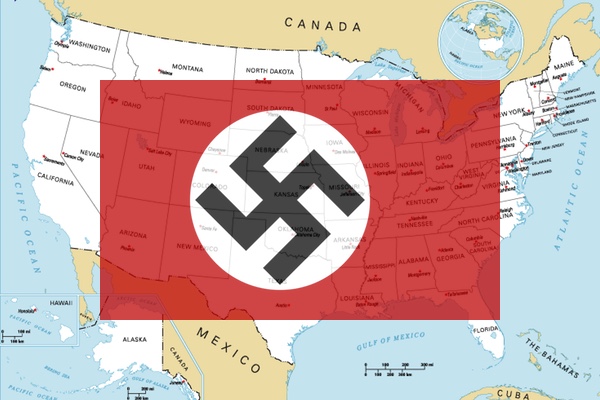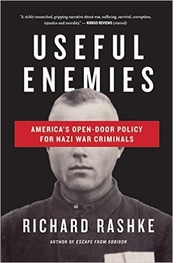The Horrible Laws that Blocked Jews from the US after World War 2 but Let Nazis in

The current refugee crisis mirrors the divisive political debate over welcoming World War II refugees under Presidents Franklin D. Roosevelt and Harry S. Truman. This series of articles views today’s crisis in the historical perspective of World War II and its aftermath. The series is adapted from the author’s book, Useful Enemies: America’s Open-door Policy for Nazi War Criminals.
 In 1945, President
Harry Truman went behind the back of an anti-immigrant Congress and
xenophobic country and issued “The Truman Directive.”
Twenty-three thousand unwanted Jewish refugees entered America in
1946 under that executive order. Three years later, after constant
pressure from the White House, Congress finally passed the Displaced
Persons Act of 1948. It wasn’t what it seemed.
In 1945, President
Harry Truman went behind the back of an anti-immigrant Congress and
xenophobic country and issued “The Truman Directive.”
Twenty-three thousand unwanted Jewish refugees entered America in
1946 under that executive order. Three years later, after constant
pressure from the White House, Congress finally passed the Displaced
Persons Act of 1948. It wasn’t what it seemed.
The 1948 act stipulated that the Departments of State and Justice could issue up to 200,000 visas to war refugees over a two-year period. Truman had asked originally for 400,000 over four years. By 1948, 90 percent of European war refugees had already been settled or returned to their homelands. Given that only one to two million were still in displaced persons camps, the number 200,000 appeared to be generous. Hiding behind those statistics, however, was a systemic bias against Jews and Catholics, making the Displaced Persons Act of 1948 more an act of exclusion than inclusion.
The bias began with what looked like a random cutoff date of December 22, l945—any person who entered a refugee camp after that date was not eligible for a U.S. visa. In reality, the date was a slap in the face of President Truman because it rendered ineligible more than 90 percent of the mostly Polish Jews who had survived the Holocaust. Greeted with pogroms in postwar Poland, they sought safety in neighboring Germany after December 22, 1945.
In the end, the congressional cutoff date wasn’t random at all. Truman had signed his directive on December 22, 1945. Whereas he intended it to bring unwanted Jews to America, Congress subsequently used it to keep unwanted Jews out. As the President put it in his June 22, l948, statement criticizing the congressional act: “It must frankly be recognized that this bill excludes Jewish displaced persons, rather than accepting a fair proportion of them along with other faiths.”
Then, to make it nearly impossible for the eligible remaining 10 percent of mostly Polish Jews to secure U.S. visas, the 1948 bill also added a list of financial, occupational, and good conduct restrictions. Just as the United States had, under an old immigration law, blocked the entry of more than nine hundred Jewish refugees stranded on the ship St. Louis, it now blocked the entry of Jewish refugees under the new 1948 law. The reason for the bigotry was obvious—1948 was an election year and anti-Semitism was part of the fabric of American society.
The Eightieth Congress didn’t stop with Jews. It used the same “device” to block the entry of Catholics from Iron Curtain countries, who made up 70 percent of the refugees living in DP camps. The Allies had liberated thousands of these refugees who, as a matter of conscience, refused to return home to live under atheistic communist regimes. Others had fled West after 1945, when it was clear that they would have to live under a communist government. The reason for the congressional bigotry was clear. Postwar America was not only anti-black and anti-Semitic, it was also anti-papist.
Once again, Truman voiced his concern in his critique of the Displaced Persons Act: “I know what a bitter disappointment this bill is to the many displaced victims of persecution who banked on the United States for hope.”
The 1948 law went on to stipulate that 30 percent of the 200,000 refugees who would be granted visas under the act (60,000) had to be farmers, a regulation that further discriminated against Jews, who couldn’t own land, and favored Ukrainians and Belarussians, who could and did. The bill also reserved 50,000 slots for Volksdeutsche, who were mostly descendants of seventeenth-century German settlers in Eastern Europe and who had maintained cultural and emotional ties to Germany. The Nazi SS zealously recruited Volksdeutsche to help find, round up, and kill Jews. The SS also recruited Volksdeutsche, most of whom were fluent in both German and Eastern European languages, to be SS camp guards and their unit leaders.
The 1948 act also mandated that 40 percent of the refugees (80,000) admitted to the United States had to come from the Soviet annexed countries of Latvia, Estonia, Lithuania, Belorussia, and Ukraine.
***
It was generally known by 1946 that more than a million mayors and governors, police officers, Quislings, partisans, and ordinary civilians in those annexed countries had volunteered for service in Nazi Einsatzgruppen (death squads) and the Wafffen SS (armed SS). Their job was to help the SS and Gestapo identify and exterminate more than two million Jews in Eastern Europe. The SS called them “trusted people” (Vertrauensmänner or V-Leute). They were more than eager to help. As one German officer put it: “We were frightened at the bloodthirstiness of these people.”
Joseph Stalin had no love for Nazi collaborators. As a consequence, an estimated two hundred thousand of them fled West with the retreating German army, according to German historian Dieter Pohl. After the war, the displaced persons camps were bulging with Eastern European Nazi collaborator-refugees, including approximately 5,000 SS guards like John Demjanjuk and members of the three most vicious anti-Semitic fascist groups in the Balkans—Arrow Cross (Hungary), Iron Guard (Romania), and Ustascha (Croatia).
The FBI and the CIA welcomed Nazi collaborators like pennies from heaven. FBI director J. Edgar Hoover used them as Cold War spies, informants, and anti-communist leaders in their respective émigré communities. There is no evidence that he ever reported a Nazi collaborator to the Department of Justice or the Immigration and Naturalization Service for investigation of visa fraud. For its part, the CIA both encouraged and secretly funded the collaborators’ governments-in-exile that were taking root in America. These government councils helped former Nazi collaborators get visas and, once safe in the United States, protected them.
***
Finally, the Displaced Persons Act of 1948 not only made it extremely difficult for Jews and Catholics to obtain visas, it also made it easy for the Nazis and their collaborators hiding in displaced persons camps to get visas. Although the bill blocked the entry of communists into the United States, it had deliberately neglected to make Nazis and collaborators ineligible for U.S. visas, unless they had already been convicted of a war crime.
In effect, the Displaced Persons Act of 1948 had a not-so-hidden agenda. More than 70 percent of the refugees eventually admitted under the act were born in countries occupied or dominated by the Soviet Union. By disproportionately favoring Ukrainians, Belorussians, and Baltic citizens, the bill made it relatively easy for the Nazi collaborators among them to get visas to the United States, while paradoxically making it extremely difficult for their Jewish victims to get visas. As a result, an estimated three to five thousand Nazi collaborators from Eastern Europe entered the United Sates. (Some have raised that estimate to ten thousand.)
President Truman had hoped that Jewish and Catholic opposition to the Displaced Persons Act of l948 would shame lawmakers into approving a series of corrective amendments. He was disappointed. Although nine Jewish organizations challenged the act, not a single Catholic organization denounced it. Then, when outside pressure didn’t work, Truman—known more for stubbornness than patience—called a special session of Congress a month after passage of the bill. He demanded a series of amendments to eliminate the discriminatory regulations.
“The Displaced Persons Act in its present form discriminates unfairly against some displaced persons because of their religion, land of origin, or occupation,” Truman told Congress. “These provisions are contrary to all American ideals. This act should be promptly amended to wipe out these discriminations.”
Congress failed to act for two years.
Finally, in 1950, Congress extended the Displaced Persons Act for two more years. The amended law gave Truman almost everything he had asked for. It would admit another 200,000 war refugees over the next two years, bringing the total to 400,000. It also eliminated the anti-Jewish and anti-Catholic “device,” and erased the preference for farmers, Volksdeutsche, and Baltic immigrants. By that time, however, more than one hundred thousand Belorussian, Estonian, Latvian, Lithuanian, and Ukrainian refugees—and the Nazi collaborators hiding among them—had already entered the country.
The Displaced Persons Act of 1950 also corrected a deficiency in the 1948 act. Although the revised bill did not exclude former Nazis and Nazi collaborators by name, it barred “any person who advocated or assisted in the persecution of any person because of race, religion, or national origin.” To guide U.S. consuls and their investigators in enforcing the ban, the Displaced Persons Commission compiled a country-by-country “Inimical List” of more than 275 organizations which it deemed to be criminal. Any applicant who had belonged to any of those organizations would be ineligible for a visa.
The Department of State, however, made it easy for war criminals such as Bishop Valerian Trifa (Romania) and Andrija Artukovic (Croatia) to remain U.S. citizens in spite of being identified. When Moscow or a Soviet bloc country asked the United States to extradite a former Nazi collaborator for trial—or punishment if he or she had been convicted in absentia—Washington refused. The United States did not recognize the courts of the Soviet Union and Soviet bloc countries.
When the Displaced Persons Act of 1950 expired, President Truman asked for a new immigration law that would admit an additional 300,000 war refugees into America. Rebuffing him once again, Congress passed the Immigration and Naturalization Act (Public Law 414) without granting the visas. Egregiously missing from section 212 of the new law, which dealt with who should be excluded from the United States, was the critical prohibition in the old law that rendered suspected war criminals ineligible for U.S. visas.
The omission slipped through Congress with hardly a ripple of protest or public debate. The implications of the deliberate deletion, however, were far-reaching. A Nazi war criminal could only be refused admission to the United States—or deported if living in America—if he or she had already beenconvicted of a war crime. In so ruling, the Immigration and Naturalization Act of l954 killed the Inimical List and set a new immigration policy. The door to America was now wide open to every stripe and brand of former Nazi and Nazi collaborator, but cracked narrowly for their victims.
In l978, more than thirty years after the passage of the l952 Public Law 414, New York Representative Elizabeth Holtzman corrected the deliberate omission in a controversial congressional amendment designed to facilitate the prosecution, deportation and extradition of Nazi war criminals and their collaborators hiding in America. The retroactive Holtzman Amendment declared as inadmissible to the United States “participants in Nazi persecution, genocide, or the commission of any act of torture or extrajudicial killing.”
In sum, Washington sent a clear message to the world with the passage and enactment of the Displaced Persons Acts of 1948 and 1950, and the Immigration and Naturalization Act of l952: The United States was passionate about keeping Jews and communists out of America, but welcomed Nazi war criminals and their collaborators.
